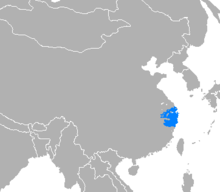Wu language
| Wu | |
|---|---|
|
吳語/吴语 ngu1 ngiu1 |
|

Wu (Wú Yǔ) written in Chinese characters
|
|
| Native to | China; Overseas Chinese communities from Shanghai and Wu-speaking regions |
| Region | East China (City of Shanghai, Zhejiang, southern Jiangsu, parts of Anhui and Jiangxi provinces) |
| Ethnicity | Wu peoples (Han Chinese) |
|
Native speakers
|
80 million (2007) |
| Dialects |
|
| Language codes | |
| ISO 639-3 | |
| Glottolog | wuch1236 |
| Linguasphere | 79-AAA-d |
 |
|
| Wu Chinese | |||||||||||||||||||
| Simplified Chinese | 吴语 | ||||||||||||||||||
|---|---|---|---|---|---|---|---|---|---|---|---|---|---|---|---|---|---|---|---|
| Traditional Chinese | 吳語 | ||||||||||||||||||
|
|||||||||||||||||||
| Transcriptions | |
|---|---|
| Standard Mandarin | |
| Hanyu Pinyin | wúyǔ |
| Wu | |
| Romanization | ngu1 ngiu1 |
| Yue: Cantonese | |
| Jyutping | ng4 yu5 |
| Southern Min | |
| Hokkien POJ | ngô͘-gí / ngô͘-gú |
Wu (Shanghainese: IPA: [ɦu˨˨ ɲy˦˦], Suzhounese: IPA: [ɦəu˨˨ ɲy˦˦], Wuxi dialect: IPA: [ŋ˨˨˧ nʲy˨˨]) is a group of linguistically similar and historically related varieties of Chinese primarily spoken in the whole city of Shanghai, Zhejiang province and southern Jiangsu province.
Major Wu dialects include those of Shanghai, Suzhou, Ningbo, Wuxi, Wenzhou/Oujiang, Hangzhou, Shaoxing, Jinhua and Yongkang. Wu speakers, such as Chiang Kai-shek, Lu Xun and Cai Yuanpei, occupied positions of great importance in modern Chinese culture and politics. Wu can also be found being used in Shaoxing opera, which is second only in national popularity to Peking opera; as well as in the performances of the popular entertainer and comedian Zhou Libo. Wu is also spoken in a large number of diaspora communities, with significant centers of immigration originating from Qingtian and Wenzhou.
...
Wikipedia
